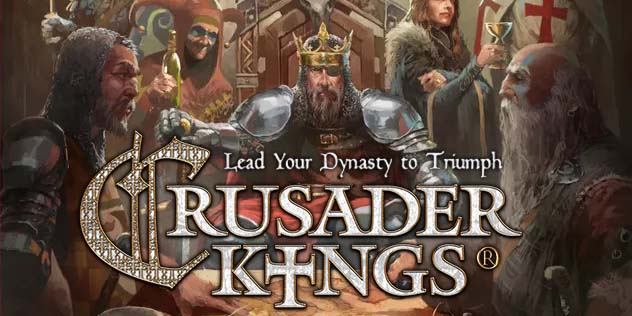
I wasn't very surprised to see a game like Sid Meier's Civilization adapted to a board game. Civ (the computer game) was always heavily inspired by board games to begin it, and so it's mechanics translated easily back into board game formats without losing much other than the broader scope of the PC game.
Paradox's Crusader Kings, on the other hand, is a totally different beast of a PC game. It is an insanely complicated, system-based blend of grand strategy game, RPG, and social sim. It simulates thousands of individual characters across hundreds of countries and duchies through dozens of generations. The possibility space is vast. As such, I would never have expected to see anyone attempt to try to boil down this deep historical simulation into a tabletop board game. Well, I guess I shouldn't say "never". In this age of every media property being adapted to board game formats, I suppose it was inevitable for someone to try.
And someone did try. In 2019, a year before the release of the Crusader Kings III PC game, Swedish board game manufacturer Fria Ligen ("Free League Publishing") released a board game version licensed by Paradox. I received the game as a gift last fall (during the height of social distancing during the COVID-19 pandemic), and so didn't get to start playing the game until well into 2021, when we finally felt a little more comfortable meeting up with friends.
As much a story-generator as a board game
For any PC players coming to the board game, there is something very important that you should know about Crusader Kings: the Board Game: it's focus is largely on the story-telling aspect of the Crusader Kings experience. If you play the Crusader Kings PC game as a hardcore strategy game, then you will probably find the board game lacking in that respect. The Crusader Kings board game is as much a story generator as it is a strategy game -- perhaps moreso.
As a story generator, my friends and I have found Crusader Kings to be very entertaining. It's certainly one of the better story-telling games that I've ever played.
Each action card will include a random event that is either disruptive to the current player,
or which benefits another player.
The way that Crusader Kings creates its little stories is through the random events of each player's action cards, and through the resolution of events by drawing trait tokens. Each turn, a player plays a pre-selected card from their hand. You perform your chosen action, and then you resolve a random event on the card. All cards, except for the "Crusade" action cards, will have a random event that is either harmful to the active player, or which provides a benefit to another player (usually the next player in the turn order).
Many actions and card events will also require that the player draw traits from a bag (similar to a die roll in most other games). Each player character starts with a pre-determined set of traits at the start of the game, and can acquire new traits through marriages, succession, or other events. All your traits go into a bag, and you draw one or more blindly from the bag to resolve a given trait check and determine the outcome of an event.
Player actions, card events, and trait draws, thus combine together to create emergent stories in both the short and long term. Sometimes these little stories can play out over the course of a few actions or turns. Other times, game-long narratives can form. [More]
34573e81-f1df-4d97-b5bc-74233cbd3e71|0|.0
Tags:Crusader Kings, Paradox Interactive, Free League Publishing, emergent narrative, grand strategy, history, medieval, Europe, crusades, war, casus beli, dynasty, succession
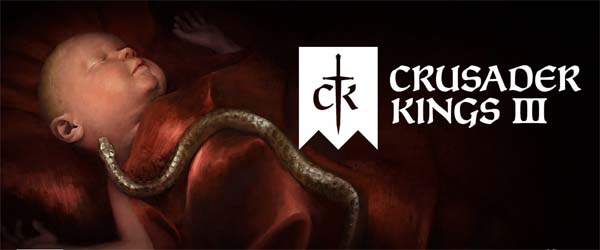
My blog readers know that I'm a fan of historic strategy games. Two of my favorite PC game franchises are Civilization and Total War, and I've dipped my hands into plenty of other historic strategy games ranging from the prehistoric Dawn of Man, all the way to Ultimate General: Civil War and Company of Heroes. But there's one prestigious set of historic strategy games that I've yet to get into. That is Paradox's historic strategy lineup of Crusader Kings, Europa Universalis, and Hearts of Iron. I own Crusader Kings II and Europa Universalis IV on Steam, and I've always wanted to get into them. I have a friend who plays them a lot, and the game looks really fun, but I was just never able to figure either of them out.
I tried booting up both a couple times and was just immediately overwhelmed. I tried the Crusader Kings II tutorial twice, and still didn't feel like I had a firm enough grasp on the game to feel compelled to keep playing. Part of that is because both games have myriad expansions and DLC that have just further complicated the games and repeatedly raised the bar of entry for newcomers. The only one of Paradox's tutorials that I felt gave me a reasonable grasp on the game was the tutorial for Stellaris.
When I saw previews for Crusader Kings III, I immediately put it on my watch list and committed myself to buying it day one, so that I could get in on the ground level in the hopes that it will be easier to grasp before Paradox starts releasing countless DLCs. It seems to have paid off, as I've been hooked on the game on and off since launch, and that addiction has cut into my Civ playing time, as well as delayed many of my blog projects and YouTube content. So for those of you eagerly awaiting new Civ strategies or the next installment of "How Madden Fails to Simulate Football", you can blame Paradox Interactive for the delay...
I am not the state
As someone who was never able to get into the previous game, I cannot say if Crusader Kings III is "dumbed-down" compared to its predecessor. It is, after all, still insanely complicated. But I definitely feel like it has a gentler learning curve and a much more effective tutorial compared to its predecessors. The hand-holding of the tutorial really did help me get a better understanding of how the various mechanics were working, and I've also found it much easier to navigate the revised U.I. and find the information that I'm looking for. I still feel like I have no idea what many of the U.I. panels mean, but I at least understand enough of the basics this time around to actually feel comfortable playing the game.
If you're unfamiliar, Crusader Kings is a medieval grand strategy game in which you play as the king of a small, European (or Middle Eastern or African) kingdom. You engage in diplomacy and court intrigue to increase your wealth and power, fight wars to conquer territory, and manage your growing holdings. But unlike a game like, say Civilization, you do not play as an abstraction of the state itself. Instead, you play as a line of rulers in a single family dynasty. You play as a single king (or queen) character at any given time. This king grows old, and eventually dies, at which point, you take control over you chosen heir and continue playing the game as that character. If you ever get to a point in which you have no family heir to carry on when you die, it's Game Over.
When your player character dies, you take over as that character's primary heir.
As much improved as the tutorial is, I do feel that it has one glaring weakness: it doesn't really cover succession. The tutorial basically puts you in control of a 40-year-old king in Ireland. It shows you how to press a few claims, use a casus belli to press those claims, create a title, deal with vassals, marry off a child, and then it basically just hands you the reigns and says "OK, now keep playing". And yeah sure, these are all the things that you spend most of the game doing. But I would say that arguably the most important part of the game is declaring your heir and setting up your inheritance to maximize the territory that your primary heir retains power over. I think succession is the single most important part of the game, and the tutorial doesn't cover it at all. When it finally happens, there's a tool tip that pops up to explain some stuff, but it didn't really help me all that much to understand what was happening, and a tool tip popping up after the fact certainly didn't help me to prepare for my king's inevitable death and inheritance. [More]
eb8fb312-cf3a-447e-aaf9-982c809e4e0e|0|.0
Tags:Crusader Kings, Crusader Kings 3, Paradox Interactive, Paradox Development Studio, strategy, grand strategy, RPG, history, simulation, medieval, king, Europe, crusades, war, casus belli, dynasty, inheritance

Souvenir board game!!!
During a holiday in Europe, I procured a few souvenir board games to add to my collection.
I didn't have room in my luggage for the larger Stonehenge Anthology Game or the Ring of Stones game. So instead of buying them in the Stonehenge gift shop, I ordered them online and had them shipped to my house. They were both waiting for me when I returned home from the trip! The Ring of Stones game was purchased directly from the English Heritage online shop's Stonehenge gifts section. The Anthology game had to come from Amazon because it isn't available from the English Heritage online shop, but I got a really good deal on it!
There was also some Stonehenge Monopoly and playing cards, but I'm not into those sorts of novelty variations that I can get anywhere. It was the unique games that caught my eye.
The third game that I brought back from Europe is a medieval Viking game called "Hnefatafl". I had seen it in the Viking Ship Museum gift shop when I was there last November, but I didn't buy it at the time because I wasn't sure if its rules were written in English or Danish. I didn't want to buy a game that I'd never be able to play because I couldn't read the rules. So when I saw the same game in the British Museum's gift shop this summer, I decided to go ahead and get it.
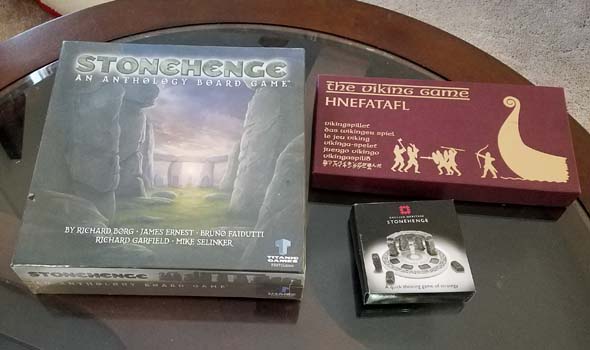
My European souvenir board games include 2 Stonehenge-themed games and a traditional Viking game.
I already talked about the Stonehenge Ring of Stones game and the anthology game, so today I will talk about the game that I should have bought in my first trip to Denmark: Hnefatafl (The Viking Game).
The Viking Game: Hnefatafl
While the previous Stonehenge-themed games are modern inventions, the Viking Game Hnefatafl (ne-fe-ta-fel) is a classic Norse game from the early middle ages. It was invented around 400 CE. It has some similarities to chess, but predates that game by at least 500 years. Besides, chess traces its lineage to India, so it's unlikely that Hnefatafl is a predecessor of chess.
Basically, Hnefatafl is an asymmetrical, chess-like game in which the single king and his defenders is ambushed and surrounded by the other player's pieces. All pieces move vertically or horizontally across the board (like rooks in chess), and pieces are killed/captured by flanking them on two opposing sides. The objective for the king's player is for the king to escape to any corner of the board; while the attacking player's objective is to defeat the king by surrounding it on all four orthogonally-adjacent spaces.
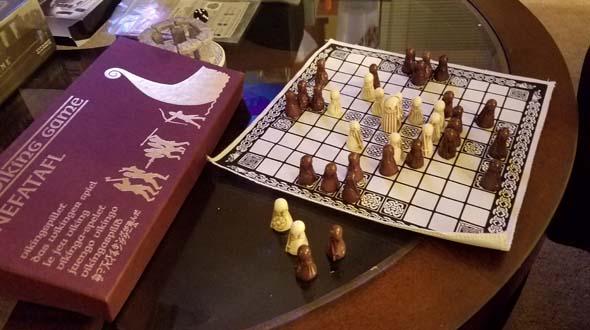
Hnefatafl is an asymmetrical, chess-like game in which a single king tries to escape from an ambush of attackers.
One of the things that makes the game a bit challenging (compared to chess) is that attacks can come from any direction, and every piece can hypothetically move the entire distance of the board... [More]
d734d0b3-ea54-41d2-9ce4-cdcc203a6765|0|.0
Tags:Hnefatafl, Viking Chess, the Viking game, Viking, chess, board game, king, pawn, rook, Denmark, Viking Ship Museum, Europe, ambush

Souvenir board game!!!
During a holiday in Europe, I procured a few souvenir board games to add to my collection.
I didn't have room in my luggage for the larger Stonehenge Anthology Game or the Ring of Stones game. So instead of buying them in the Stonehenge gift shop, I ordered them online and had them shipped to my house. They were both waiting for me when I returned home from the trip! The Ring of Stones game was purchased directly from the English Heritage online shop's Stonehenge gifts section. The Anthology game had to come from Amazon because it isn't available from the English Heritage online shop, but I got a really good deal on it!
There was also some Stonehenge Monopoly and playing cards, but I'm not into those sorts of novelty variations that I can get anywhere. It was the unique games that caught my eye.
The third game that I brought back from Europe is a medieval Viking game called "Hnefatafl". I had seen it in the Viking Ship Museum gift shop when I was there last November, but I didn't buy it at the time because I wasn't sure if its rules were written in English or Danish. I didn't want to buy a game that I'd never be able to play because I couldn't read the rules. So when I saw the same game in the British Museum's gift shop this summer, I decided to go ahead and get it.

My European souvenir board games include 2 Stonehenge-themed games and a traditional Viking game.
Yesterday, I talked about the Ring of Stones game that I purchased from the English Heritage Trust. Today, I'm going to talk about the next game that I purchased on this trip to Europe: the Stonehenge anthology game. Next up, I'll review the Viking Game Hnefatafl.
Stonehenge Anthology Game: five games in one
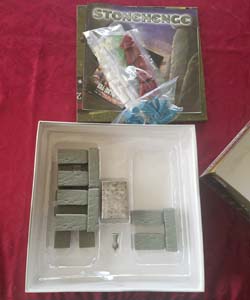
The box doesn't have very efficient compartments.
This Stonehenge game is an "anthology game" released by Paizo games (the same company that publishes the popular Pathfinder RPG). It is effectively five small games in one, with each game sharing the same components and having been designed by a different designer, with credits ranging from Magic: the Gathering to Memoir '44 to Axis and Allies. The primary concept (according to the instruction book) is that the game components were designed first, and then given to each of the game designers, who then had to create rules for a game to play with those components and the given theme. Each designer took a different explanation for the origin or purpose of Stonehenge (even far-fetched ones) as the basis for his rule set... [More]
71ad6985-49dd-4926-b8d3-bc35f37b1888|0|.0
Tags:Stonehenge, Stonehenge Anthology Game, Paizo Games, board game, anthology, Europe, England, UNESCO World Heritage Site, electoral college, war, auction, chariot, racing, King Arthur, knights, trilithon, cards, Richard Garfield, Bruno Faidutti, Richard Borg, James Ernest, Mike Selinker

Souvenir board game!!!
During a holiday in Europe, I procured a few souvenir board games to add to my collection.
I didn't have room in my luggage for the larger Stonehenge Anthology Game or the Ring of Stones game. So instead of buying them in the Stonehenge gift shop, I ordered them online and had them shipped to my house. They were both waiting for me when I returned home from the trip! The Ring of Stones game was purchased directly from the English Heritage online shop's Stonehenge gifts section. The Anthology game had to come from Amazon because it isn't available from the English Heritage online shop, but I got a really good deal on it!
There was also some Stonehenge Monopoly and playing cards, but I'm not into those sorts of novelty variations that I can get anywhere. It was the unique games that caught my eye.
The third game that I brought back from Europe is a medieval Viking game called "Hnefatafl". I had seen it in the Viking Ship Museum gift shop when I was there last November, but I didn't buy it at the time because I wasn't sure if its rules were written in English or Danish. I didn't want to buy a game that I'd never be able to play because I couldn't read the rules. So when I saw the same game in the British Museum's gift shop this summer, I decided to go ahead and get it.

My European souvenir board games include 2 Stonehenge-themed games and a traditional Viking game.
I'm going to talk specifically about the Ring of Stones game right now. I'll also be reviewing the Stonehenge anthology game and the Viking Game Hnefatafl in the following posts in the coming days.
Stonehenge "Ring of Stones"
I'll go ahead and start with the simplest game of the bunch: the Stonehenge Ring of Stones game. This is a 2-player dice-rolling game in which the first player attempts to build a stone circle by placing standing stones and covering them with cap stones, while the second player attempts to tear the circle down. The number rolled by the die tells the given player what kind of move he or she is allowed to make. If the first player successfully places all the stones on the board, he or she wins. The second player wins by removing all the pieces from the board.
Sounds pretty simple. And it is.
The box advertises the game as a "quick-thinking game of strategy". That label is being a bit generous. Most of the game really comes down to the luck of the die roll.
Strategy consists entirely of taking advantage of lucky rolls to prevent your opponent from making a legal move.
[LEFT] Rolled 3, but no legal position to place capstone; [RIGHT] Rolled 5, but can't legally remove standing stone.
If the first player rolls a three, but there are no legal positions to place a capstone, then that player must forfeit that turn. Conversely, if the second player rolls a five, but can't legally remove any standing stones because they're all covered by capstones, then that player loses the turn. So the strategy for player one is simply to try to cover every stone with at least one capstone, so that in the 1-in-6 likelihood that player two rolls a five, he or she must miss the turn. Player two's strategy, therefore is to try to remove standing stones so that in the 1-in-6 likelihood that player one rolls a three, he or she has no two adjacent standing stones on which to place a capstone and must miss his or her turn... [More]
|

| 12 | | | | | | | 60 | | 11 | | | | | | | 55 | | 10 | | | | | | | 50 | | 09 | | | | | | | 45 | | 08 | | | | | | | 40 | | 07 | | | | | | | 35 | | 06 | | | | | | | 30 | | 05 | | | | | | | 25 | | 04 | | | | | | | 20 | | 03 | | | | | | | 15 | | 02 | | | | | | | 10 | | 01 | | | | | | | 05 |
|